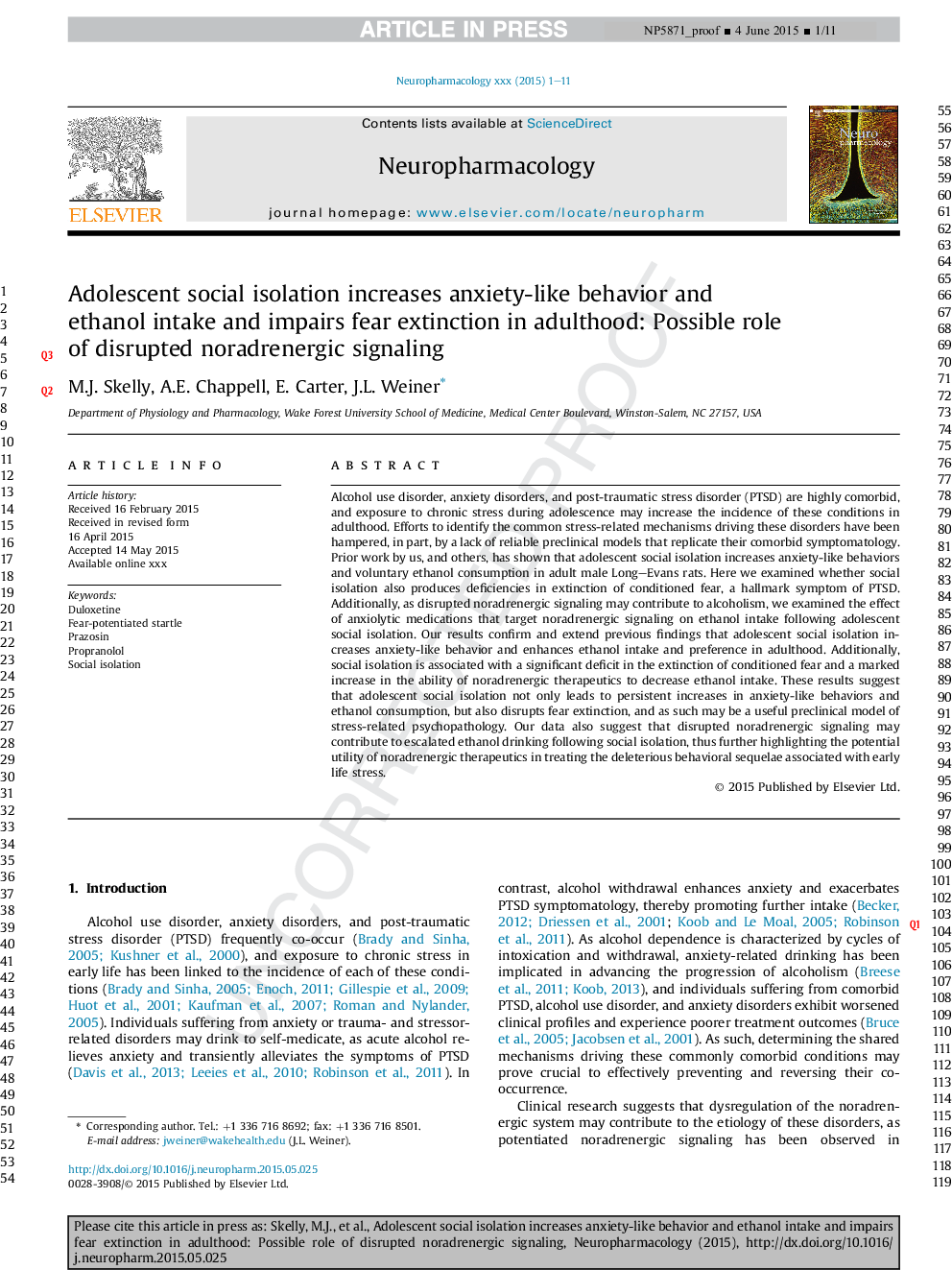| کد مقاله | کد نشریه | سال انتشار | مقاله انگلیسی | نسخه تمام متن |
|---|---|---|---|---|
| 5813956 | 1556618 | 2015 | 11 صفحه PDF | دانلود رایگان |
عنوان انگلیسی مقاله ISI
Adolescent social isolation increases anxiety-like behavior and ethanol intake and impairs fear extinction in adulthood: Possible role of disrupted noradrenergic signaling
ترجمه فارسی عنوان
انزوای اجتماعی نوجوانان، رفتار اضطراب مانند و مصرف اتانول را افزایش می دهد و باعث کاهش ترس از انقراض در بزرگسالی می شود: نقش احتمالی نشانه های نودادن انرژی
دانلود مقاله + سفارش ترجمه
دانلود مقاله ISI انگلیسی
رایگان برای ایرانیان
کلمات کلیدی
دوولتسستین، نا امیدی ترسناک، پرازوسین، پروپرانولول، انزوای اجتماعی،
موضوعات مرتبط
علوم زیستی و بیوفناوری
علم عصب شناسی
علوم اعصاب رفتاری
چکیده انگلیسی
Alcohol use disorder, anxiety disorders, and post-traumatic stress disorder (PTSD) are highly comorbid, and exposure to chronic stress during adolescence may increase the incidence of these conditions in adulthood. Efforts to identify the common stress-related mechanisms driving these disorders have been hampered, in part, by a lack of reliable preclinical models that replicate their comorbid symptomatology. Prior work by us, and others, has shown that adolescent social isolation increases anxiety-like behaviors and voluntary ethanol consumption in adult male Long-Evans rats. Here we examined whether social isolation also produces deficiencies in extinction of conditioned fear, a hallmark symptom of PTSD. Additionally, as disrupted noradrenergic signaling may contribute to alcoholism, we examined the effect of anxiolytic medications that target noradrenergic signaling on ethanol intake following adolescent social isolation. Our results confirm and extend previous findings that adolescent social isolation increases anxiety-like behavior and enhances ethanol intake and preference in adulthood. Additionally, social isolation is associated with a significant deficit in the extinction of conditioned fear and a marked increase in the ability of noradrenergic therapeutics to decrease ethanol intake. These results suggest that adolescent social isolation not only leads to persistent increases in anxiety-like behaviors and ethanol consumption, but also disrupts fear extinction, and as such may be a useful preclinical model of stress-related psychopathology. Our data also suggest that disrupted noradrenergic signaling may contribute to escalated ethanol drinking following social isolation, thus further highlighting the potential utility of noradrenergic therapeutics in treating the deleterious behavioral sequelae associated with early life stress.
ناشر
Database: Elsevier - ScienceDirect (ساینس دایرکت)
Journal: Neuropharmacology - Volume 97, October 2015, Pages 149-159
Journal: Neuropharmacology - Volume 97, October 2015, Pages 149-159
نویسندگان
M.J. Skelly, A.E. Chappell, E. Carter, J.L. Weiner,
